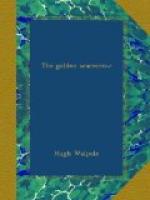“I can’t let him go! I can’t let him go!”
The curtain came down.
John turned, his eyes wide, his cheeks pale with a pink spot on the middle of each.
“I say, pass those chocolates along!” he whispered hoarsely. Then, recovering himself a little: “I wonder what they did to him? They must have done something to his legs, because they were all crooked when he came out.”
EPILOGUE
HUGH SEYMOUR
I
It happened that Hugh Seymour, in the month of December, 1911, found himself in the dreamy orchard-bound cathedral city of Polchester. Polchester, as all its inhabitants well know, is famous for its cathedral, its buns, and its river, the cathedral being one of the oldest, the buns being among the sweetest, and the Pol being amongst the most beautiful of the cathedrals, buns and rivers of Great Britain.
Seymour had known Polchester since he was five years old, when he first lived there with his father and mother, but he had only once during the last ten years been able to visit Glebeshire, and then he had been to Rafiel, a fishing village on the south coast. He had, therefore, not seen Polchester since his childhood, and now it seemed to him to have shrivelled from a world of infinite space and mystery into a toy town that would be soon packed away in a box and hidden in a cupboard. As he walked up and down the cobbled streets he was moved by a great affection and sentiment for it. As he climbed the hill to the cathedral, as he stood inside the Close with its lawns, its elm trees, its crooked cobbled walks, its gardens, its houses with old bow windows and deep overhanging doors, he was again a very small boy with soap in his eyes, a shining white collar tight about his neck, and his Eton jacket stiff and unfriendly. He was walking up the aisle with his mother, his boots creaked, the bell’s note was dropping, dropping, the fat verger with his staff was undoing the cord of their seat, the boys of the choir-school were looking at him and he was blushing, he was on his knees and the edge of the kneeler was cutting into his trousers, the precentor’s voice, as remote from things human as the cathedral bell itself, was crying, “Dearly beloved brethren.” He would stop there and wonder whether there could be any connection between that time and this, whether those things had really happened to him, whether he might now be dreaming and would wake up presently to find that it would be soon time to start for the cathedral, that if he and his sisters were good they would have a chapter of the “Pillars of the House” read to them after tea, with one chocolate each at the end of every two pages. No, he was real, March Square was real, Polchester was real, Glebeshire and London were real together—nothing died, nothing passed away.




